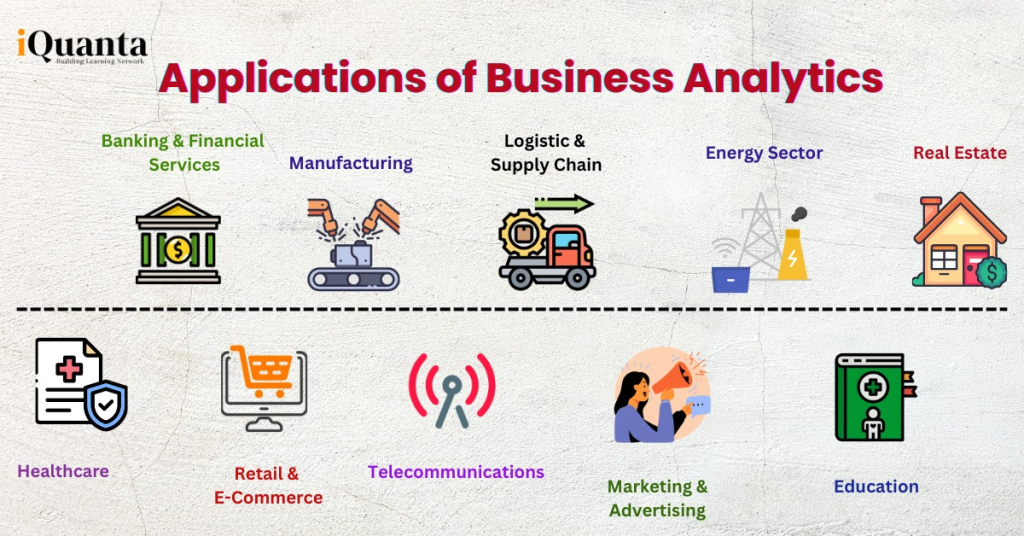In this fast moving world data is often called the assets for various businesses. Every click, transaction, and interaction generates valuable information that businesses can use to gain a different edge. But raw data is itself not complete. It is the insights we draw from that data that truly matter. This is where business analytics comes into play.
From predicting users behavior to improving healthcare outcomes, business analytics is transforming how companies make decisions. It is not just a trend but it is a required thing for growth for staying related to the economy. Whether you are a student exploring career options or a professional looking to upskill, understanding the real world applications of business analytics is a great place to start.
In this blog, we will explore the top 10 industries where business analytics is making the biggest impact and along with practical examples and tools used in each domain.
What are the applications of business analytics?
Business analytics means using data to help companies make better decisions, work more efficiently, and grow. By studying past and current data, businesses can find useful patterns, understand what might happen in the future, and take actions based on the given facts. It helps turn raw data into clear ideas that support smart planning and daily work.
Today the applications of business analytics can be found in many areas like marketing, banking and financial services, human resources, supply chains, and customer service. Companies use it to learn what customers want, find ways to increase sales, save money, avoid risks, and help employees perform better.
In this tutorial we are covering top 10 industrial applications in business analytics that helps users to understand where all we are using this term.
Top 10 Applications of Business Analytics
Let’s explore top industrial applications of business analytics which includes healthcare, banking, retail, e-commerce, manufacturing, telecommunications, logistics, supply chain, marketing, energy and education sector.

Healthcare
The healthcare industry is quickly moving toward tech-enabled, patient-first services. As of 2024, the global market is valued at $12 trillion. Telemedicine, which allows doctors to consult patients remotely, is growing at a CAGR of 18.2%.
AI and machine learning help detect diseases early through scans and reports. Remote patient monitoring tools track health in real time using wearables. In addition, blockchain keeps medical records safe and prevents data tampering.
However, the sector still faces challenges. Data privacy, system compatibility, and strict health regulations remain big hurdles.
Banking and Financial Services
Banking is becoming faster, safer, and more personal. The global financial market has reached $26.5 trillion in assets under management. FinTech is booming, and over 60% of users now prefer digital services.
AI is used to detect fraud, approve loans, and chat with customers. Open banking makes it easy to share account data between apps. Moreover, tools like robo-advisors help people invest with little effort.
Still, the sector must address major issues. Cybersecurity, complex rules, and outdated systems can slow progress.
Retail & E-Commerce
Retail and e-commerce have changed the way we shop. In 2024, the e-commerce market hit $6.3 trillion. Consumers expect smooth, fast, and personal service which are both online and in stores.
AI recommends products, forecasts demand, and segments customers. Augmented reality allows shoppers to try products virtually. In addition, chatbots and voice assistants make customer support easy and quick.
On the backend, smart tools help manage inventory and track shipping. Despite this, high competition and rising delivery costs remain serious challenges.
Manufacturing
The manufacturing sector is changing fast, thanks to smart tools and automation. This shift is often called Industry 4.0. Machines now use sensors and AI to reduce errors and improve product quality.
One major application of business analytics in manufacturing is predictive maintenance. It helps spot equipment issues before they cause downtime. Companies also use analytics to control inventory, plan production, and cut waste.
However, there are some challenges. These include high costs of new tech and the need for skilled workers.
Telecommunications
Telecom companies are leading the way in digital transformation. With the arrival of 5G, people now enjoy faster and more reliable internet. At the same time, businesses benefit from better data handling and connectivity.
Business analytics plays a key role here. It helps providers improve customer service, spot network problems, and reduce user churn. Moreover, AI is being used for real-time support and self-healing networks.
Still, telecom firms face issues like high setup costs and data security risks.
Logistics & Supply Chain
This industry is all about moving goods efficiently. In 2025, companies use AI, IoT, and business analytics to track deliveries and manage warehouses.
One of the top applications of business analytics in this field is route optimization. It finds the fastest, cheapest way to deliver goods. Another key use is demand forecasting, which helps businesses keep the right stock levels.
Even with smart tools, companies still struggle with delays, fuel costs, and global disruptions.
Marketing & Advertising
Marketing has become smarter and more focused. Today, brands use business analytics to understand their audience and improve results.
They study data from Google Ads, websites, and social media to track what works and what doesn’t. Predictive analytics helps marketers decide the best time to show ads. Also, tools like chatbots and email automation create better user experiences.
As a result, campaigns are now more personal and cost-effective. But marketers must be careful with user data and follow privacy laws.
Energy Sector
The energy sector is going green and smart. Companies now use analytics to manage power use and improve system performance.
Smart meters and grids collect real-time data. With business analytics, companies predict energy demand and detect equipment issues early. This helps reduce waste and cut down on energy costs.
However, this sector faces challenges too, such as old systems, cyber risks, and high costs of clean energy tech.
Education Sector
Education is no longer limited to classrooms. Online platforms, virtual labs, and smart content are now part of daily learning.
Business analytics is used to track student progress, find learning gaps, and improve teaching methods. AI tools suggest courses based on a student’s strengths. Schools and colleges also use analytics to manage operations and plan future growth.
While digital tools improve access, issues like internet access and data privacy still exist.
Real Estate
Real estate is becoming more digital and data-driven. Buyers now take virtual tours, get price suggestions from AI, and complete deals online.
Business analytics helps real estate companies forecast property prices, find the best locations, and understand buyer needs. These insights help agents close deals faster and improve customer satisfaction.
Although the market is booming, it still faces challenges such as changing regulations and fraud risks.
Conclusion
As we move deeper into 2025 the applications of business analytics will only grow. Companies that adopt these tools early will gain a strong competitive edge. Whether it’s improving patient care, optimizing supply chains, or personalizing marketing campaigns, business analytics is the driving force behind better, data-informed decisions.
If you are looking to stay ahead in your industry then it is the time to explore how business analytics can reshape your strategy and operations.
FAQs (Applications of Business Analytics)
What is business analytics, and why is it important for industries?
Business analytics involves using data, statistical methods, and technologies to analyze business performance and support decision-making. It helps industries reduce costs, improve efficiency, and stay competitive in a data-driven world.
How is business analytics used in healthcare?
In healthcare, business analytics is used for predicting patient outcomes, managing hospital resources, detecting diseases early, and improving overall patient care. It also helps in tracking and reducing operational costs.
What are some real-world applications of business analytics in manufacturing?
Manufacturers use business analytics for predictive maintenance, quality control, inventory management, and production planning. These applications help minimize downtime, reduce waste, and improve product delivery timelines.
Can small businesses benefit from business analytics?
Yes, absolutely. Small businesses can use analytics to understand customer behavior, optimize marketing campaigns, manage inventory, and make better financial decisions — all with cost-effective tools available today.
What are the main challenges coming?
The main challenges include data privacy issues, lack of skilled professionals, outdated infrastructure, and high implementation costs. However, with the right tools and training, these barriers can be overcome.





![Top 10 Applications of Linked List Data Structure [2025]](https://www.iquanta.in/blog/wp-content/uploads/2025/02/WhatsApp-Image-2025-02-01-at-2.48.42-PM-218x150.jpeg)

